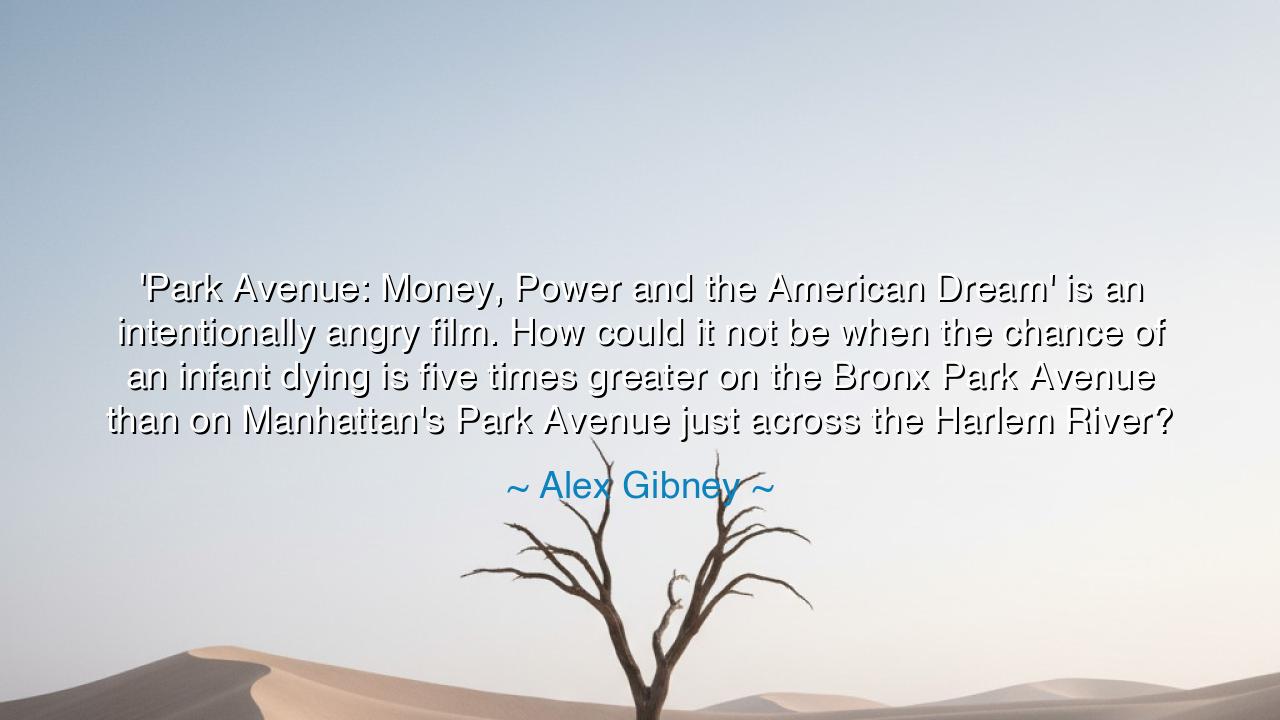
'Park Avenue: Money, Power and the American Dream' is an
'Park Avenue: Money, Power and the American Dream' is an intentionally angry film. How could it not be when the chance of an infant dying is five times greater on the Bronx Park Avenue than on Manhattan's Park Avenue just across the Harlem River?






In the tapestry of human history, there are few forces more potent than inequality. The divide between the privileged and the oppressed has existed for as long as civilization itself, and it is a truth that has inspired both anger and action across the ages. In his documentary, 'Park Avenue: Money, Power, and the American Dream', Alex Gibney captures the heart of this societal fracture when he says, “‘Park Avenue: Money, Power, and the American Dream is an intentionally angry film. How could it not be when the chance of an infant dying is five times greater on the Bronx Park Avenue than on Manhattan’s Park Avenue just across the Harlem River?’” These words are a cry to the heavens, a profound lament over the stark contrast between two worlds that share the same city, yet exist in diametrically opposed realities.
The ancients were no strangers to the devastating effects of inequality. In the world of ancient Greece, the gap between the aristocracy and the common people was vast, and this division sparked not only philosophical inquiry but political revolution. Plato, in his Republic, explored the idea of the ideal society, where justice and fairness prevailed, and the wealthy did not exploit the poor. His writings were a call for a world where people lived in harmony, not based on the accidents of birth, but on their true merit and virtue. But the reality of his time—and perhaps our own—is often quite different. The divisions between those who control wealth and those who suffer from its absence are not just an abstraction; they are a lived experience, one that Gibney emphasizes with his statement.
Consider the tragic tale of Rome—an empire that, at its height, stood as a beacon of power and luxury, but also as a symbol of profound inequality. The patricians, the ruling class, lived in opulence and indulgence, while the plebeians, the working class, faced hunger, disease, and poverty. The story of Spartacus, the slave who led a rebellion against the mighty Roman Empire, underscores the deep resentment that such inequality breeds. Spartacus’ uprising was not just a battle for freedom; it was a cry for justice, a rebellion against a world that allowed a few to thrive at the expense of the many. Similarly, Gibney’s film highlights the disparity between the wealthy and the impoverished, showing that in a world where such inequality exists, life itself becomes a game of chance—where the privileged are born into safety, while the marginalized are left to suffer, often without hope of escape.
This deep divide, where the fates of children, families, and communities are often determined by zip code rather than merit or virtue, continues to this day. In Gibney’s example, the Bronx Park Avenue—a place where poverty and death are disproportionately prevalent—stands in stark contrast to the wealth and privilege of Manhattan’s Park Avenue, just a stone’s throw away. This disparity is not an accident; it is the result of centuries of social and economic systems designed to maintain the status quo—systems that favor the powerful and leave the disenfranchised to bear the burden of poverty. Gibney’s anger is not just a personal emotion; it is the anger of history itself, the anger of those who have been oppressed, and the anger of the society that has failed to close the chasm between these two worlds.
The lesson here is one that transcends time and place. The ancients recognized that a society cannot truly thrive when inequality and injustice run rampant. The very foundation of a just society is built upon the principle that all people, regardless of birth, have an equal chance at a life of dignity and opportunity. Gibney’s film serves as a call to action, urging us not only to recognize the profound disparities that persist in our world but also to take responsibility for correcting them. In a world where chance often determines life or death, health or illness, the rich or poor, the time for action is now.
In our own lives, we must acknowledge the truths that Gibney presents. We must not turn a blind eye to the inequality that exists around us but instead strive to be a part of the solution. Whether through advocating for social change, supporting those who are marginalized, or challenging the systems that perpetuate injustice, we must act with the conviction that we, too, are responsible for the world we live in. It is not enough to simply be angry—we must channel that anger into action, pushing for a society where privilege does not define life’s outcome, and where every individual is afforded the same opportunity to thrive.
Let us take Gibney’s words as a reminder that the path to a just society is not one of complacency but of vigilance and action. We must not only recognize the inequalities that divide us but actively work to bridge the gap between the privileged and the disadvantaged. For as the ancients taught us, a society is only as strong as its weakest members, and true greatness lies in our ability to lift each other up, not to turn a blind eye to suffering. May we strive to be the change that history calls us to, knowing that the power of collective action can indeed create a world where justice and equality are not just ideals, but realities.






AAdministratorAdministrator
Welcome, honored guests. Please leave a comment, we will respond soon